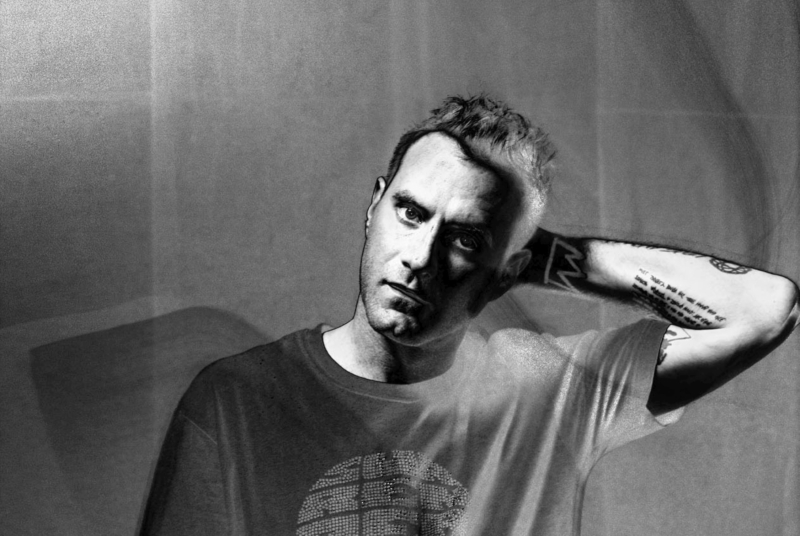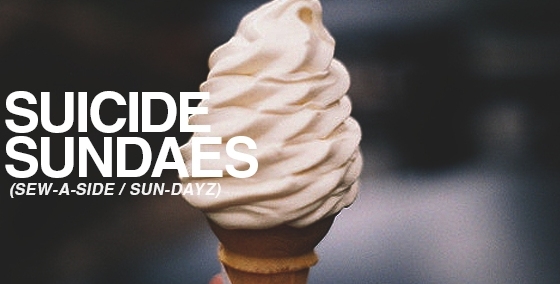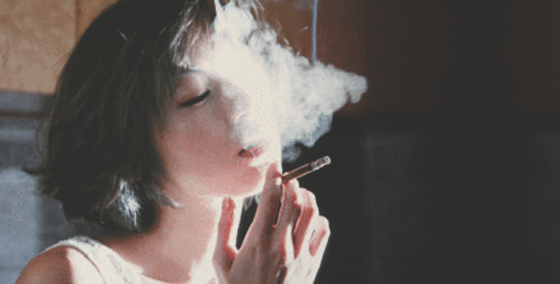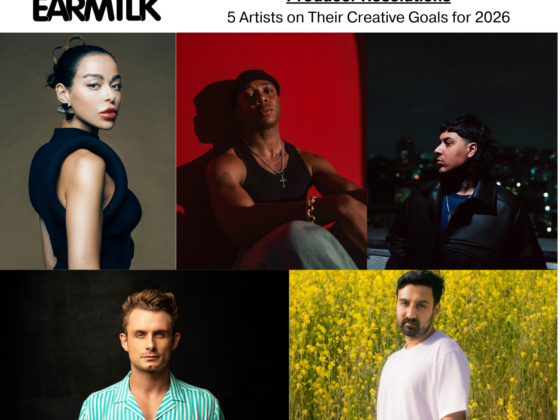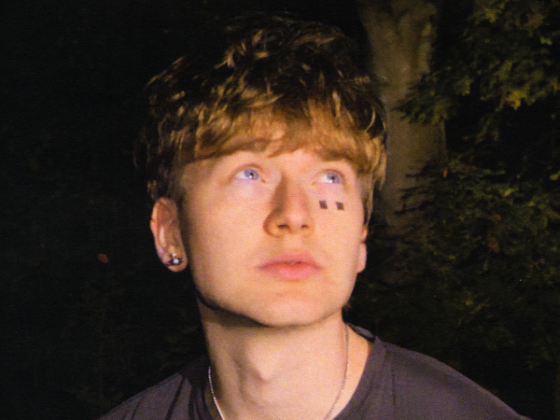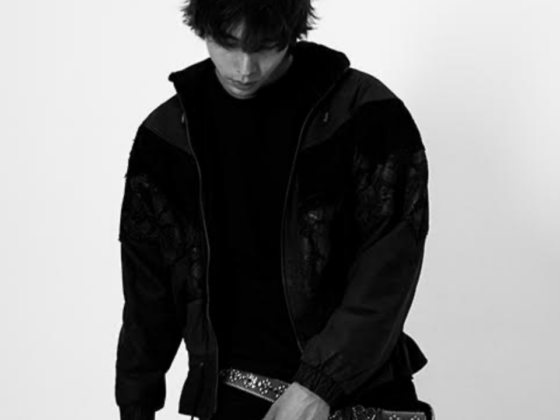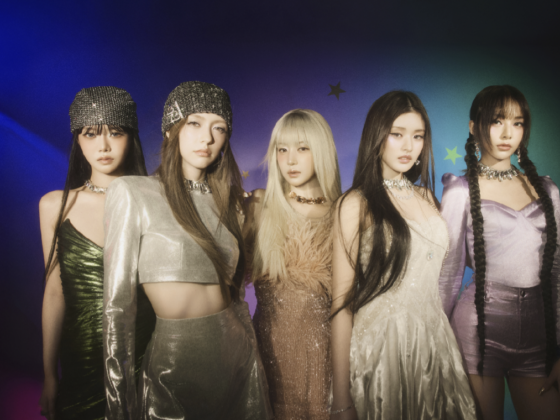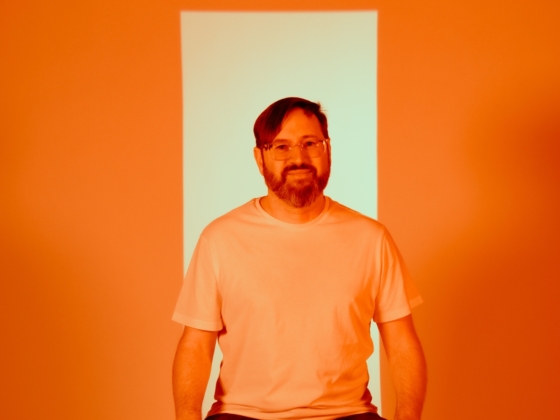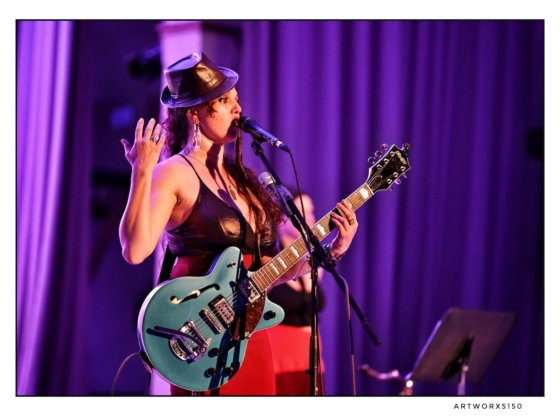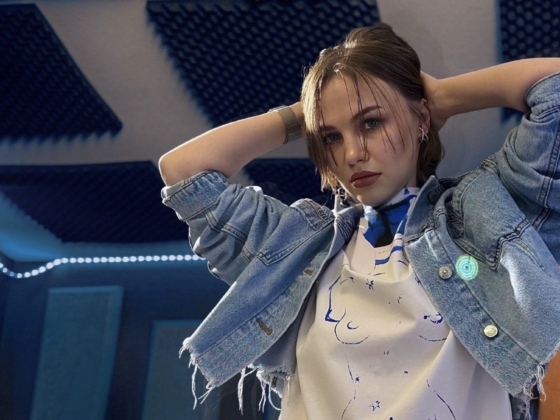With a sound heavily influenced by the hip-hop of the late 90s, James Lavelle, known by many for his work with UNKLE, is back with more of his unique form of musical creativity and captivating collaborations. Owner of the Mo' Wax label, which features artists like DJ Shadow and Attica Blues, James is one of those artists that doesn't know when to quit, and rightfully so. From mixing the inaugural Fabric Live set to producing several movie soundtracks, he continually shows the music world that his style and drive are nothing to question.
Respectively, nothing at this point seems off limits for him. In many ways, he's already done it all—he doesn't need to do anything more—but James isn't a man for complacency. While critics continue to grumble about his gradual divergence from the trip hop feel of his early days, it's important to remember that James has been pushing musical boundaries for the better part of twenty years—in fact, it's likely that at least one of your favorite artists, movies, or TV shows have been involved with or at the least influenced by James' work. From early forays into the beat sampled hip hop cognizance of Psyence Fiction, to the more cinematic ventures in End Titles… Stories for a Film, to the more recent almost alternative rock of Where Did the Night Fall, Lavelle can't escape his need for artistic exploration—and why should he?
Armed with an arsenal of experience and an ever-changing need to go one step further, there are few artists that are as interesting as James. We met up with him to discuss his recent ventures, most notably his recent mix "Living in My Headphones, part 1". Despite his work with Queens of the Stone Age, running his label Mo'Wax, and a glorious video project with Black Dog Films, the mix tracks in at around two hours long—a lengthy piece for a man so busy.
An early pioneer of the sample based DJ industry that runs so prevalent in today's culture, James has dipped his brush in almost every musical palette possible—whether by collaboration or personal exploration. He was DIY before DIY was even a recognized practice in music, directing everything involved in each project. His flirtations with fashion have been no less ahead of their time than the iconic sampling that pushed his renown style to the forefront of the DJ culture in the late 90's. He is unquestionably one of the most influential artists of the past twenty years, but despite that influence his music has always been met with a fair dose of criticism—something that seems to stem from people's general inability to accept change than anything else. James Lavelle is the real deal, and he's here to tell you why.
EARMILK: Going way back, pre-early collaborations, pre-UNKLE, how did you waltz into this line of work?
UNKLE: I started working in some pretty prevalent London record stores, so I met a lot of people through that and DJing. I began that when I was 15, which also led to residencies in a lot of clubs in London that had previously existed or were just starting. I then started Mo'wax when I was 18, and because of the nature of the label it was very collaborative with musicians, artists, fashion—all of those scenes that were happening in ‘90s London. It was one of the first labels that really connected London and the United States.
My first stab into really collaborating with bands (other than signing bands and the label) was working on the Psyence Fiction record, and it just grew from there. I was DJing all over the world, from L.A. to Japan to London, and as things do, they just came together. My partner at the time was working at Alexander McQueen, and I was working with a lot of designers. It was a very collaborative sort of culture—the lunatics running the asylum, really.
EM: Right, and it sounds like you came into all of this, especially with the trip-hop that—not to take away from your music at all—but it was sort of a right place, right time, being there at the precipice of this new movement. Was it surprising for you how quickly things picked up?
U: Yeah, time is a strange thing, and things happen very quickly over a period of time—it always feels like it takes longer than it actually does. It felt like it took a particularly long period of time, it never felt like it happened particularly easy, but in retrospect, it was very quick, and ended very quick.
It was an extraordinary time in London, and being a 21-year-old in London with a label deal with Universal was sort of unheard of. I met a lot of people, and was fortunate to be one of the first there when the doors opened. I also put everything I had into it, so there was a bit of pushing from my end, it wasn't like the doors opened for me themselves. It wasn't entirely luck—hardly at all, really.
EM: Understandably so, and I think your coming of in music in the mid-to-early 90's—to draw a slight comparison, the DJs who stepped up during the recent popularity with dubstep, and this weird sort of electronic revival that's happened in America over the past couple years—it's clear that the group of people who all started at the same time were fortunate to get on that boat before it set sail, but the ones who pushed hardest are the ones that have stayed relevant and maintained success, while the others who just tried to ride the wave tended to fade out.
U: It's like that with any musical revolution. Punk people always tend to reference The Clash, and the Sex Pistols, and whoever else, but in reality there were thousands and thousands of bands that came through that people have forgotten about. I don't know, I've managed to do what I do and keep doing that through sheer perseverance and stubbornness more than anything (laughs). I think for many people, Psyence Fiction would have been the end of UNKLE, but I didn't see it in that way.
[soundcloud url="https://api.soundcloud.com/tracks/53321249" params="" width=" 100%" height="166" iframe="true" /]
EM: Looking at Psyence Fiction, The Nightfall, and UNKLE over time, it seems like the project has gone through different stages and evolutions, whether through collaborations with a different sidekick every few years, or the diversity of format, feel, and genre you've encompassed. Are you aiming for a particular purpose in these musical explorations, or is it really just trying out different things?
U: It's really just trying out different things, you know? It all really extends back to DJing. I love hearing music and am constantly looking for ways to incorporate different new sounds and discoveries I like. Essentially it's just this constant sampling experience that's been going on for the last 25 years. Whether its art, or music or film, it’s always been that sort of sample-collective, almost trainspotty (laughs) approach to music.
In the early ‘90s, it was all about "black" music, you know funk, jazz, soul. That, over time, has progressed to people discovering so many types of genres, from Turkish psychedelia to post-punk. As the world's opened, the opportunity to discover music has expanded. You also tend to grow more diverse as you grow old. When we’re younger, we're all much more elitist in what we like. I was only about hip-hop and electronic music when I was a kid, but as you discover the references for those records, and the insertions, you start opening up to more and more musical landscapes, and your tastes evolves, as mine has over the years.
My music will always reference old and new sounds, and I'll probably never stay the same for too long, musically.
EM: The music industry really is a lot more open these days, especially with the internet. Has your reception from the public changed over time as you've progressively adapted new styles—have people learned to accept it more?
U: It's funny, over the past 10 years, being eclectic has become more accepted than ever, especially in America. It's hard to get out of the box that you're initially placed in musically. I went from Psyence Fiction to Never,Never,Land. That was met with a lot of angst, because I went from doing something hip-hop-based to an electronic-based record. Things are so eclectic now, and that certainly did not exist in the same universal context back when I started.
EM: Today, with the Internet, it's so easy to access any type of music you want that it's almost impossible for people not to be open-minded about a slew of genres. Like you said, as you get older with everything in life your taste expands, but the music industry has really shifted over the past 5 or so years. It's almost been flipped on its head. With artists these days, it's pretty much expected by the fans—you want them to maintain the sound you fell in love with them for, but if they're not pushing new boundaries with every new album, it almost feels like a cop-out.
U: Right, and I think one of the problems with how the industry has changed is that the sort of filter systems, the A&R systems that once kept careers alive, aren't really around anymore. Everything is so instant now, it's almost a shock culture, it's all reactionary. You get these bands now that blow up and sell so many records for their debut and then sell hardly anything on their second album, whereas in the past, generally, bands had to build up fame. They had to work for it.
Most of the big artists of the past, the legends, had four or five records behind them before they made a breakout album. I don't really understand the rules anymore (laughs). I'm trying to make something new these days, and people say things like that they don't think I'm really relevant anymore, which I think is crazy, when you look at what we've accomplished over the years.
EM: It's funny because that's such a parallel to the mindset of this generation, where everything is based on immediate gratification. Purity Ring was a good example of this, where they blew up last year, they came out of nowhere, and all this hype was everywhere, sort of a flash mob state on the internet. Then it dissipates and I haven't heard a damn thing about them for months. The internet has done wonders for the industry, it's also cursed it in a way, and it will be interesting to see where it goes.
U: Right, I mean I didn't even have a computer when I started Mo'Wax (laughs).
[soundcloud url="https://api.soundcloud.com/tracks/52377604" params="" width=" 100%" height="166" iframe="true" /]
EM: Exactly. There's almost always someone coming out of the bushes for every one of your projects who sort of sticks their nose up and complains. How have you been able to just ignore the criticism and keep doing what you want?
U: I tend to take it on the chin. I'm a human being, so it can be very hard to deal with, but I don't make records for those people. I don't make records for journalists or music blogs or anything, I make them for myself. I do that for many reasons. One of them is to be able to creatively express myself, to be able to explore and fuck around. A lot of it is just making records for a small social crowd, where you do it for your friends and contemporaries.
I did learn the hard way though, a major reason I stopped Mo'wax was because of the criticism. I was really very fed up with it all. I have just had to get on with it though, and there are moments where you feel like you made a fool of yourself, there are moments where things go public you wish hadn't, and people do tend to say such extraordinary things.
Psyence Fiction went from one of the most revered records to one of the most criticized. There was a thing on NME saying it was one of the worst collaborative records of all time. I don't see it that way, it doesn't make much sense. You're telling me that David Guetta and Akon was better, Meatloaf and Bonnie Tyler? (laughs) I mean give me a fucking break. You just get used to the fact that everyone's not going to be pleased with what you do no matter what, and you move on.
EM: There seems to be this weird stigma about Psyience Fiction. I don't tend to take everything I read or hear on the internet too seriously, especially with op/eds, but what I've read about that album seems like rabble from a bunch of people who don't really know what exactly happened, and a bunch of people who think they understand it, and feel really strongly about what they think.
U: Well, it's also part of that wonderful aesthetic about the record industry where controversy keeps things alive (laughs). I don't want to paint Josh in a negative light, ever. At the end of the day, that album was made with a lot of love, and it's unfortunate how it all played out once it was finished. One of many things I do really love about that project and what I was doing at that time was everything involved around it artistically. I was making toys, t-shirts, designing artwork, the whole DIY lot, and that's what you see most people doing nowadays, but back then it was really frowned upon. Like, I don't care what anyone has to say about it now, I fucking did that before anyone, and I'm proud of that.
EM: With your music over the years, you've worked with so many different people. You worked with Thom Yorke so early on, and now so many people’s love for him and his band is almost religious. You've always pulled, from day one really, these almost shocking collaborations. How do these things come about? Do you have them all on your phone, like can you just hit them up?
U: Some yes, some no. Some relationships are very much at the time. Things come and go. I’ve had a very long relationship with many of them now.
EM: But were these people part of your crew for the most part back in the day, or just by chance colleagues?
U: There’s no real straight answer as to the way things happen. You meet people on the road, you meet people in clubs, you work with people in the studio and then they’re friends with somebody, and so on. For instance, Brian Eno because he was friends with the producer I was working with. Queens of the Stone Age, I went to a show and gave them a CD and then the next day they called me up. We had dinner and I became friends with Josh and Nick.
Other people may have been fans in the past. Others are new or aware, but are using it maybe as a call opportunity, especially with some of the last records we’ve made, where we’ve worked with slightly up-and-coming bands. It’s a good two-way opportunity for us to work with a creative talent and for people to get a bit more exposure.
Obviously for certain people there’s a history, and you know, I’ve been turned down many times as well. I’m friends and have friendships with people I’ve collaborated with over the years, but I don’t tend to have “best friend” friendships with a lot of them.
I'll hang out in Josh's house in Queens. You know, I’m close with Ian Brown. There are collaborators like Phillip Sheppard and Ben Drury, and Phillip who’s done lots with strings and Ben, who’s done artwork. They’re family friends. I haven’t seen Thom for years and years and years, but I’ve had the type of relationship with Radiohead that if I wanted to do something with a track or go to a show then of course I can do that. So it just really depends.
[soundcloud url="https://api.soundcloud.com/tracks/52377603" params="" width=" 100%" height="166" iframe="true" /]
EM: Collaborating with these bands, has it helped you push for new explorations in music?
U: Of course. Any experience with any band gives you something unique, whether that’s through their performance, or their playing, or ideas. Or being in a situation where you’re pushing for people to look at things in a different way.
It’s very individual to the situation. A lot of the time now, the process is different, because you’re not in the studio all the time with the people you’re collaborating with. Whereas when we did Science Fiction you were in the studio with everybody. Never Never Land, you were in the studio with everybody. And War Stories, I think everything was in the studio. Whereas the last record, not so much, because of the way the Internet works and being able to upload files and logistics.
EM: You delve into the thematic things with music, so End Titles… Stories for Film and then the Edit Music For a Film soundtrack. You worked with Rich for a long time, he was on the first one. But then End Titles, did you work with him on that one as well?
U: Not for that one. I did Never,Never,Land and War Stories with Rich, and he was also around for Science Fiction as well.
EM: He sort of moved from a producer to an actual member of the group, right? How did that happen?
U: It just seemed a natural thing, I mean to me it was always about social environments, about working with your crew—a kind of crew mentality. I wanted it to be more organic and have more of a “band” approach. Knowing that Josh did the record and then went off to do other things and that meant you couldn’t really go into a record, you couldn’t promote it in a way that normal records would be. You’re kind of at the mercy of that individual. I mean that in the nicest possible way. He lives in San Francisco or London. It’s a concept record and then he goes off to do DJ Shadow records and who knows when the next record will be. I just wanted to do something I had more control over, that was more organic. I wanted to make a record with my best friend.
EM: It’s funny, because the collaborative aspect of things you lean towards—I don’t know if falling out is the right word, but you started Tim and then it seemed like you two disagreed on the collaborative aspect and he parted ways, and ever since and it’s become the crux of what you do, pushing your style on work with other people.
U: Well, I knew Tim since I was eight. Tim left when I was 21. It’s very hypothetical, we did a load of remixes. Tim wanted to go and move to New York and do different things with his life. He just got fed up with me. I think the fact that I was running a record label and DJing and didn’t have the time that we wanted to invest in the project.
But he was doing other things at the time, and changing, and I think it’s quite natural. We were kids, you know? We just started hanging around with different social environments, getting into different music. He wasn’t so into the hip-hop thing—the Shadow thing—but I was.
[soundcloud url="https://api.soundcloud.com/tracks/52377602" params="" width=" 100%" height="166" iframe="true" /]
EM: You’ve worked on UNKLE for a while. It’s been you and someone else at most times. Is there anyone, if you had to go back, who would you say “that’s been the easiest set of projects I’ve done with anyone?”
U: None of them have been easy. War Stories was really fun until the end when me and Rich exploded and nearly killed each other (laughs). That was a great experience. There were great experiences on each record, but collaborating is not any easy thing. And that’s the funny part, I think people see it as a cop out. They think, “oh he just gets someone else and then makes it and that’s it." You know what? If it was so easy there’d be a lot more records like this, believe me. It’s just not. In the end, in retrospect, I wish I could just do it all myself. But that’s not how I work. I’m not somebody that naturally wants to be on my own.
EM: I think that’s just a testament to the success and the ability to keep UNKLE running for so long, with so many people involved and having so many abrupt changes over time and different avenues that have been approached, it’s really kind of remarkable. A lot of bands tend to keep the same core intact, and eventually members go out and do their own thing, but with you it’s been you and then someone else and then someone else and someone else.
U: Yeah, ironically I wish it had just been me and Tim or me and Shadow or whatever, but it wasn’t. So it’s just become what it’s become. A lot of people come in and out because UNKLE is a way that a lot of people get to do things out of their environment. I think a lot of times in bands, they stay together for economic reasons. Like, would U2 or Radiohead or Coldplay be together now if they weren’t selling the records that they sell? Probably not. Does everybody in AC/DC hang out together all the time? I’m sure they don’t.
The biggest problem with UNKLE for me was that it never really stopped. I was with Rich, me and Rich were touring, we were living together, DJing together in the studio—it was fucking intense, those last seven years. I’m taking a break for the moment with UNKLE and working on the my next route. We were just been in each other’s shoes for so long. We’ve done 150 songs in five years. You’re doing 17, 18 hour days every day for five years. It’s not healthy and unfortunately, it implodes, and that’s not something I’ll be repeating again in the future.
[soundcloud url="https://api.soundcloud.com/tracks/52377601" params="" width=" 100%" height="166" iframe="true" /]
EM: So, looking at the future, where do you see the project going?
U: Right now we’re in a retrospective period. I'm potentially re-releasing records next year and am thinking about how I repackage and redo certain records. I’m doing a couple remixes, working with some different people—really just kind of getting back to basics again. That’s what always happens, I sort of go through a shadow period and then get back into DJing—that DJing got me back into Never,Never,Land.
You get into a system, a roll, and the machine grows. The next minute you have to look after 15 to 20 people involved with touring and before you know it you’re just feeding a machine and I don’t want to do that anymore. I’m just resetting my batteries. As always, you want to make the best record that you can, I just feel like UNKLE needs to have a bit of a break to realign itself and do something new.
EM: Absolutely. You don’t want to burn yourself out.
U: No, I burned myself out before, and that’s why it ended the way it did. A lot of these things wouldn’t have happened if there wasn’t so much going on, but it's a double-edged sword. The fact is, most of the people who were involved with UNKLE weren’t people that wanted to go out and deal with all the stuff that you have to do to create these kinds of records.
It’s not like Lennon and McCartney just writing together and singing. It doesn’t work like that. It’s not just about the music, it’s about the whole package, and that’s what I do. It tends to strain relationships and people get exhausted. I'm exhausted. It has a habit of getting out of control and I’m the one that has to pick up the pieces, and right now I’m picking up the pieces of a lot of live debts and just logistical stuff that needs to be smoothed out for it to move into the next phase.
Just creatively, the idea of constantly being in the studio, having to make music because you need to generate money to feed a machine—that isn’t the way I want to make records. I've learned a lot the last seven years doing that—I’ve built the brand to it, it’s survived, we’ve put out lots of records, we’ve done lots of film and advertising—but I don’t want to make records because I’ve got to keep a machine going. I need to kind of stop and restart and that’s all I’m trying to do.
[soundcloud url="https://api.soundcloud.com/tracks/80193105" params="" width=" 100%" height="166" iframe="true" /]

